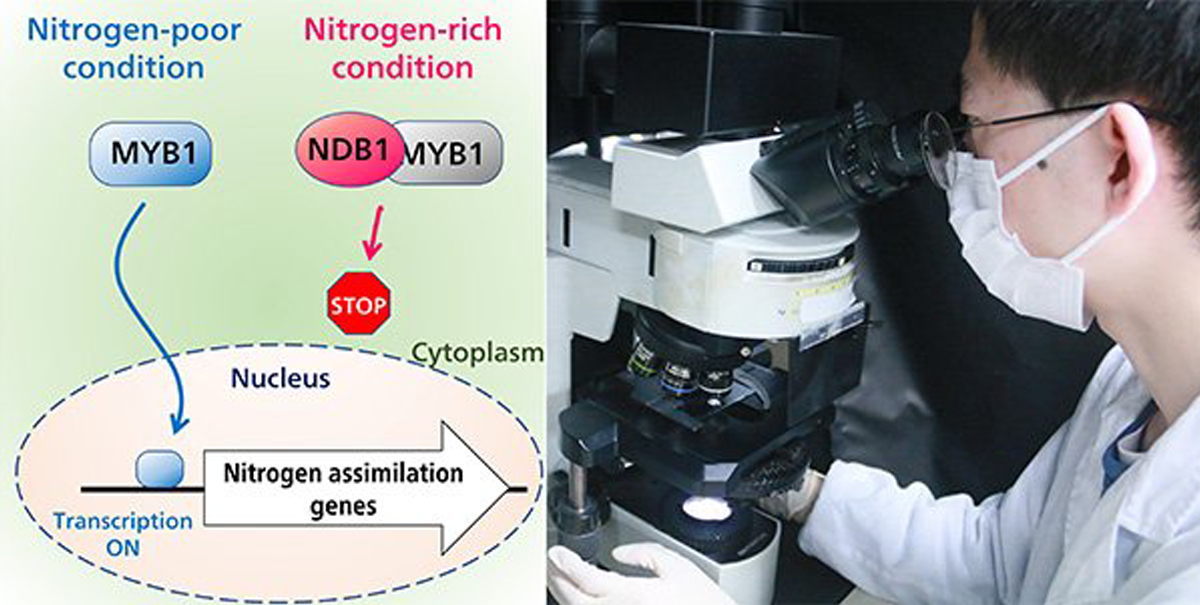
Protein Discovery Reveals Mechanisms of Nitrogen Assimilation in Plants
April 13, 2022| |
A research group at Tohoku University has discovered the protein that inhibits the formation of organic nitrogen compounds in plants. The protein could potentially be used to improve plant growth, biomass production, and crop yields.
Nitrogen is important to humans and plants. Plants use nitrate or ammonium in the environment to synthesize organic nitrogen molecules in a process called nitrogen assimilation. Crop production relies on nitrogen fertilizers for efficient nitrogen uptake. However, the mechanism behind nitrogen assimilation is still unknown to scientists.
Multiple proteins mediate nitrogen assimilation, and previous research by this group reported that the protein MYB1 serves a crucial role in inducing the expression of genes necessary for the process to take place, but becomes inhibited in high nitrogen environments. The results revealed that the novel protein NDB1 inactivated MYB1. NDB1 traps MYB1 in the cytoplasm and prevents it from functioning as a transcription factor.
"The NDB1-MYB1 pathway is a key factor in regulating nitrogen assimilation," says Kazuhiko Igarashi, professor at the Department of Biochemistry at Tohoku University's Graduate School of Medicine. "Our discovery is a breakthrough for the field of plant science," he added.
For more details, read the article in Tohoku Univerity Research News.
| |
You might also like:
- University of Florida Scientists One Step Closer Toward Crops That Make Own Nitrogen
- Nitrogen Use Efficient Wheat Developed Using CRISPR-Cas9
- Experts Find Genes Linked to Nitrogen Metabolism
Biotech Updates is a weekly newsletter of ISAAA, a not-for-profit organization. It is distributed for free to over 22,000 subscribers worldwide to inform them about the key developments in biosciences, especially in biotechnology. Your support will help us in our mission to feed the world with knowledge. You can help by donating as little as $10.
-
See more articles:
-
News from Around the World
- IPCC Report Reveals Agriculture can Halve Emissions by 2030; Help Climate Change Adaptation
- Trends on GM Foods Consumer Perception Help Identify Policy Recommendations
- ICRISAT Develops Iron-fortified Pearl Millet
- Nigeria Starts National Performance Trials for TELA Maize
- Genome Sequence of Forage Grass Now Available
- Brazil's Biotech Sugarcane Area to Double in 2022
- Shifting to Non-GM Feed Ingredients Less Beneficial to Environment, Producers and Consumers - Report
- Agri Experts Help Identify Behavioral Factors that Influence GM Tech Acceptance
-
Research Highlights
- Bacteria that Kills Fungus Affecting Sugarcane Yields Discovered
- Protein Discovery Reveals Mechanisms of Nitrogen Assimilation in Plants
- Researchers Reveal Genetic Basis of Watermelon Seed Size
-
Plant
- Novel Plant Breeding Techniques Boosts Cereal Production
-
Read the latest: - Biotech Updates (January 14, 2026)
- Gene Editing Supplement (December 17, 2025)
- Gene Drive Supplement (February 22, 2023)
-
Subscribe to BU: - Share
- Tweet

